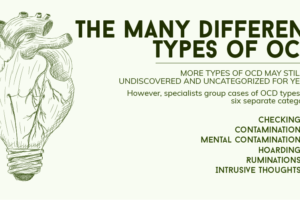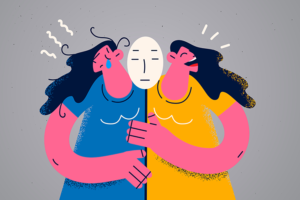Confident. Capable. Honest. Expressive. Invincible.
These were my defining characteristics as a 17-year-old junior in high school in 1995. I played Anna in “The King and I,” ran cross-country and participated in bands and choirs, among other things.
Then, I had a manic episode, and my life turned upside down. My stay in the psychiatric ward resulted in my first mental health diagnosis: bipolar disorder.
Scared. Anxious. Silent. Secretive. Ashamed.
The fallout after this episode left me looking for the powerful sense of self I had lost. Where did she go? And how could I find her again?
For 20 years after that episode, I struggled in silence and shame. I believed that, if they knew, others would want to do me harm, block me from reaching my dreams and limit me.
In 2016, I found NAMI. On my first day at the NAMI Connection Recovery Support group, I disclosed that I had bipolar disorder. My secret was out; I was terrified about what I had done, and I couldn’t sleep that night. I didn’t trust myself, and I didn’t trust the group. In fact, I didn’t return to the group for five months.
For years, I faced self-stigma and paranoia-fueled negative thoughts and feelings about myself and other people. I knew something had to change, and it started with addressing my self-stigma.
Learning To Trust Again
In 2017, I had my eighth episode and another two-week stay in the psychiatric ward. Consequently, I couldn’t trust even my beloved partner, Dean, nor my own parents. In the hospital, I was given a new injection, and ultimately, a new diagnosis: schizoaffective disorder, bipolar type. The result of the injection was miraculous. It began to dissolve my paranoia.
I began to deal with the paranoia and unpack the self-stigma that had been limiting me. I faced the difficult beliefs that had blocked true relationships. I challenged myself to refute the old records playing in my head: “She’s unreliable… she’s moody… she’s not ok…”
While researching stigma, I found a recent article from the American Psychiatric Association that highlights three kinds of stigma: public, institutional and self-imposed. While these seem to diminish our sense of trust and block us from accessing our true power, it doesn’t have to be that way. And while we can work on eliminating external types, it’s self-stigma over which we really have control.
Naturally, many of us worry about what others think, but too often, we internalize this fear, judge ourselves and hold unhelpful beliefs and emotions like shame. By facing and addressing my own self-stigma, I took ownership of my situation. From a place of personal power, I began to overcome my worries and gain the ability to trust myself. In doing so, nothing — not even public nor institutional stigma — could shake me anymore.
Sharing My Experience
As a result of a sequence of episodes and a feeling of being so alone, I finally decided to reach out. I made a list of people with whom I could trust to safely share my story. Slowly, but surely, I expanded my circle of trust. This included NAMI Connection and the local NAMI Board of Directors, which I joined in 2017. Sharing helped me give life to the stories of my trials and triumphs. I was gradually learning that there is a different way to deal with mental illness. By trusting and sharing authentically, I even discovered my story was worth telling.
The questions people asked helped me to dive deeper into my own experience. And I was amazed that people with whom I shared wanted to know more. They genuinely cared. They wanted to be part of my journey and help me to heal. I’m so grateful for these relationships that have carried me through.
When I looked outside of myself, I found love, respect, understanding, curiosity and joy in sharing. Years later, when I shared my limitations in the workplace, I found support and a willingness to work with me. I could be honest again, and this healed my heart.
Practicing Presence, Meditation And Mindfulness
Over the years, I’ve practiced presence, meditation and mindfulness. I’ve discovered how to separate myself from my negative thoughts and not to resist my emotions. I learned that my thoughts are just like passing clouds: They can be dark, stormy clouds or puffy, white manifestations — all of which are impersonal.
I don’t have to believe in them, and I don’t have to attach to them. And the same is true for my emotions. They are simply fleeting energy forms, and I don’t have to make a story out of them. Through practice, I was able to learn more fully how to make peace with my thoughts and emotions. Even during my episodes, I applied my skills and was able to lessen my suffering.
Discovering Reverence For Myself
Confident. Capable. Honest. Expressive. Invincible. Peaceful.
After nearly 30 years of living with serious mental illness, I’m no longer looking for myself in the past. I have discovered a reverence for myself and as such, I have renewed confidence, and I’m capable in different ways than before. Everything I believed would limit me has been transformed. My return to NAMI Connection was an important milestone. What I found is that the perceived barriers of self-stigma can be dissolved by truth, love and trust. My power lies in my ability to transcend my self-stigma.
Finally, as Eckhart Tolle teaches, “The world can only change from within.” I have the power to go within, transcend my own limiting beliefs and self-judgments and deal with my shame. Once I have done so, I’m not concerned anymore about institutional and public stigma. I feel invincible again, but this time it comes not from ego, but from a deep inner peace.
Farrah Fritz has a B.A. in Psychology and a M.A. in Speech, Language and Hearing Sciences from the University of Colorado at Boulder. She is the Vice President on the Board of Directors for her local NAMI Affiliate. She gives NAMI In Our Own Voice talks and facilitates a NAMI Connection Recovery Support group. She is currently writing a mental health memoir. Farrah is also a pianist and teaches Koru Mindfulness classes besides working full-time as a Catering Supervisor for Sodexo. She loves traveling to Mexico with her partner and best friend, Dean, of nearly 27 years.
Source: https://nami.org/Blogs/NAMI-Blog/May-2023/Transcending-the-Self-Stigma-From-my-Youth




